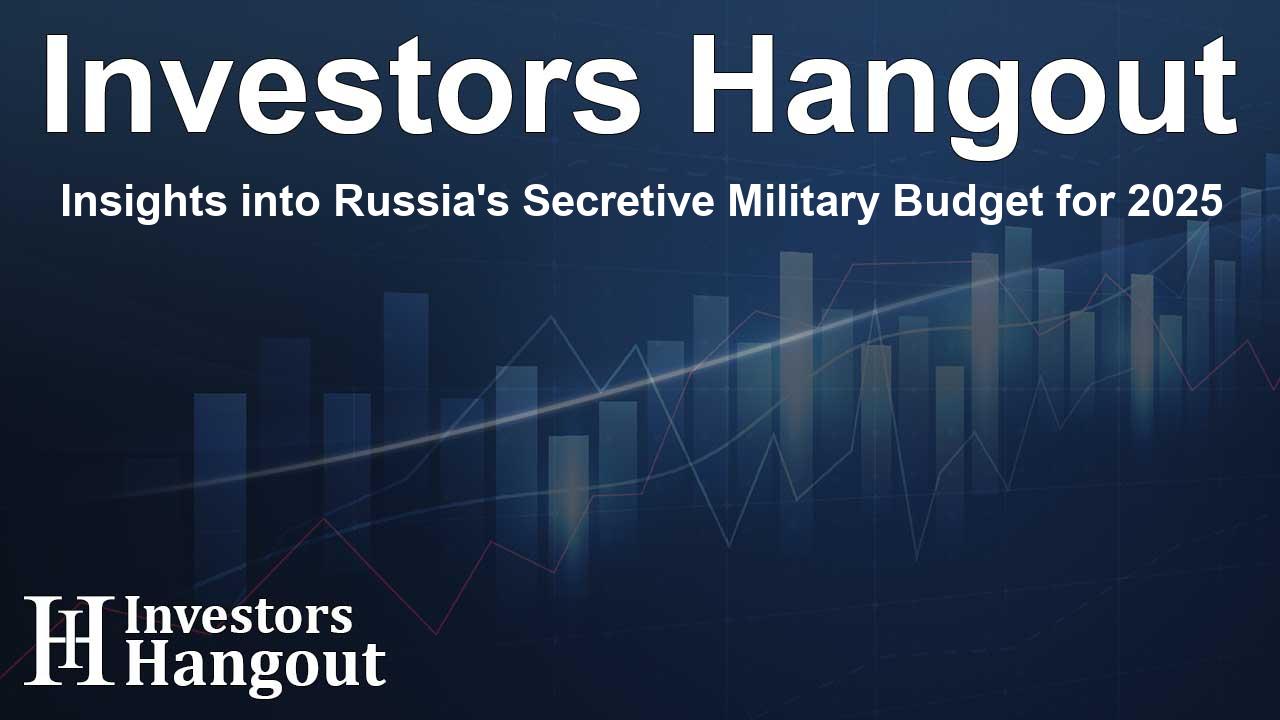Insights into Russia's Secretive Military Budget for 2025

Understanding Russia's 2025 Military Budget
As the world watches, Russia is preparing its state budget for the upcoming year, a budget that emphasizes military spending amid a backdrop of secrecy. The budget proposal introduces a significant 25% increase in military expenditure, marking this as one of the most cloistered fiscal outlines in the annals of post-Soviet Russia.
Budget Overview and Financial Expectations
The projected government expenditure for the next year amounts to a staggering 41.5 trillion roubles, equivalent to around $443.14 billion. This figure, surprisingly substantial, reflects additional income anticipated from increased taxes imposed on corporations and individual earners. However, the clarity surrounding these funds is anything but straightforward, as only 28.4 trillion roubles have been clearly earmarked for specific programs.
The Secretive Nature of Defense Spending
A considerable portion of the budget remains under wraps, with approximately 85% of national defense financing classified. This trend has carried over from the previous fiscal year, where 30% of the spending was similarly obscured. Additionally, the government ceased publishing execution data on budget figures in May 2022, signaling a shift towards greater opacity and an effort to protect the economy against international sanctions.
Expert Analysis on Fiscal Implications
Experts like economist Evgeny Suvorov highlight a concerning trend—the ongoing militarization of the economy. This focus on military allocation has not only surprised the government’s central bank but also necessitated a careful review of inflation projections that currently hover around 9%. The central bank's analytical department is now tasked with determining the long-term impacts of these budget decisions on economic stability.
Utility Rates and Public Spending Surprises
Among the unexpected developments in the budget are significant increases in state-regulated utility tariffs, which are set to rise by nearly 12%. This hike is startlingly double that of early estimates and poses challenges related to public welfare and inflation expectations. The overall increase in total public spending amounts to 7.6%, which further complicates fiscal assessments and requires stringent monitoring from central authorities.
Prioritizing Military and Social Needs
In light of these developments, the government maintains that priorities will continue to revolve around military commitments linked to ongoing operations and social programs that cater to the populace. This focus is evident as officials describe the new budget as balanced, with expectations of a reduced deficit standing at 0.5%, down from a project of 1.7% for the current year.
Restoration of the Budget Rule and Economic Stability
The return of the budget rule is also highlighted, a mechanism designed to stabilize the economy by reserving surplus energy revenues. Initially suspended following geopolitical tensions, its restoration signals a commitment to fiscal discipline and economic fortitude
Media Response and Public Discourse
Interestingly, mainstream media in Russia has largely skirted discussions around the military spending hike, diverting attention instead to financial aid for vulnerable population groups. Analysts working for state-run financial institutions have similarly refrained from openly criticizing the proposals, presenting a cautious approach to public discussions about national fiscal strategies.
Concluding Thoughts on Russia's Fiscal Future
As experts navigate the implications of these expenditures, there remains an air of apprehension regarding the long-term inflationary impact of such a budget. Economists, like Rodion Latypov from VTB, express cautious optimism tempered by concern. The unfolding situation calls for close examination as these financial strategies play out.
Frequently Asked Questions
What are the main features of Russia's 2025 budget?
The budget features a significant increase in military spending, with a total projected expenditure of 41.5 trillion roubles, and a high degree of secrecy surrounding defense finances.
How does the increase in utility tariffs affect public spending?
The hike in utility tariffs by nearly 12% is expected to exacerbate inflationary conditions and impact public welfare efforts.
What is the 'budget rule' and its importance?
The 'budget rule' helps manage surplus energy revenues to ensure economic stability. Its restoration reflects a focus on fiscal discipline.
Why is military spending being prioritized in the budget?
Military spending is prioritized due to ongoing geopolitical tensions and the government's declared commitment to defense and security operations.
What are the likely implications for inflation with the new budget?
Analysts predict that increased spending, particularly in utility tariffs, will heighten inflation expectations, requiring careful management from economic regulators.
About Investors Hangout
Investors Hangout is a leading online stock forum for financial discussion and learning, offering a wide range of free tools and resources. It draws in traders of all levels, who exchange market knowledge, investigate trading tactics, and keep an eye on industry developments in real time. Featuring financial articles, stock message boards, quotes, charts, company profiles, and live news updates. Through cooperative learning and a wealth of informational resources, it helps users from novices creating their first portfolios to experts honing their techniques. Join Investors Hangout today: https://investorshangout.com/
Disclaimer: The content of this article is solely for general informational purposes only; it does not represent legal, financial, or investment advice. Investors Hangout does not offer financial advice; the author is not a licensed financial advisor. Consult a qualified advisor before making any financial or investment decisions based on this article. The author's interpretation of publicly available data shapes the opinions presented here; as a result, they should not be taken as advice to purchase, sell, or hold any securities mentioned or any other investments. The author does not guarantee the accuracy, completeness, or timeliness of any material, providing it "as is." Information and market conditions may change; past performance is not indicative of future outcomes. If any of the material offered here is inaccurate, please contact us for corrections.